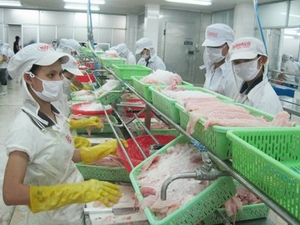 dent Barack Obama on February 7 approved the 2014 Farm Bill which says that Vietnamese catfish (tra and basa) will be put under the US monitoring.
dent Barack Obama on February 7 approved the 2014 Farm Bill which says that Vietnamese catfish (tra and basa) will be put under the US monitoring.The most noteworthy thing of the farm bill is that the function of monitoring the catfish imports will be handed over to the Department of Agriculture (USDA) from the Food and Drug Administration (FDA).
According to Le Chi Binh, Deputy Chair of the An Giang Provincial Fisheries Association, the FDA now only takes control over the imports’ hygiene, while it does not monitor the farming process. Vietnamese have to manage the farming themselves, or the farming quality is certified by the third parties.
Once the USDA undertakes the work, it will control the farming as well and set up the requirements for the farming areas. This means that only if Vietnam can meet the standards, will it be able to export catfish to the US. The seafood quality certificates like ASC or Global GAP would not have much significance.
However, Truong Dinh Hoe, Secretary General of the Vietnam Association of Seafood Exporters and Producers (VASEP), has reassured the public that Vietnamese exports would not be influenced in 2014.
The USDA has to announce the regulations on how the monitoring process would be implemented, which products would be put under the monitoring and relevant issues within 60 days since the day the bill was approved by the US President.
“I think that it will take the USDA time to do this, which means that the monitoring process would only be started by early 2015,” Hoe said.
Analysts have commented that the US has levied an unjustified imposition on Vietnam’s catfish, which aims to protect its domestic production, the thing that comes contrary to the principle of the trade liberalization.
It is really unreasonable for the US to impose its standards on Vietnamese farming and refuse the products recognized globally.
Dao Tran Nhan, the Vietnamese Trade Counselor in the US said at the Trade Counselors’ Conference held in HCM City some days ago that it would take Vietnam 5-7 years at least to upgrade the production process in accordance with the US standards before it can resume the export to the US. In other words, it would be very difficult for Vietnam to bring its cheap and high quality catfish products to the US.
The press released on the official website of the Vietnamese Embassy in the US has shown Vietnam’s protest against the US decision. It says that the US Congress has ignored its commitments to implement the trade liberalization when refusing to reject the USDA’s catfish inspection program.
Hoe from VASEP said it is now impossible to ask the US to stop the program. The thing Vietnam should do now is to request the US side to carry out the monitoring program in a reasonable and fair way.
Hoe went on to say that Vietnam can sue the US before the World Trade Organization (WTO) if it can find evidence of the US local production protection.





